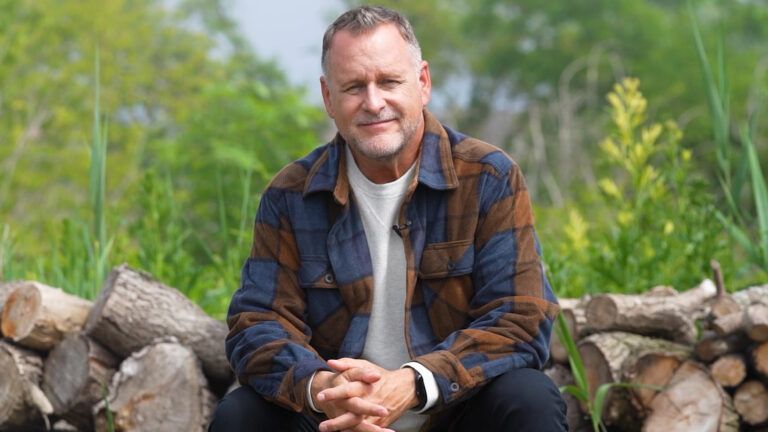Bob L.: Hi Guideposts, my name is Bob L., and I’m here to talk about addiction and relationships.
I’m an active member of Alcoholics Anonymous. Not a spokesman for the group, just a member. But out of respect for AA’s tradition of anonymity, I’m not using my last name, just my first name and last initial. And Guideposts has been kind enough to respect that tradition of anonymity by now showing my face in any of the pictures.
Jim Hinch: So, first thing I just wanted you to talk about a little bit are sort of what you see as some of the primary ways that alcoholism damages relationships.
Bob L.: There’s two elements to that, and the first is a physical fact of the addiction. And that’s gonna take the craving for the substance, in my case mostly alcohol, is gonna take precedence over everything, whether I admit it or not.
I love the metaphor that Dr. Carl Meninger used, that an alcoholic is like a person who’s on fire who runs into the ocean and then drowns. They run into the ocean to put out the fire, and then drown. When I visualize that, I think about somebody running through a crowded beach, and they’re gonna bump into people, they’re gonna knock people over, but if you’re on fire, that’s secondary. “I gotta get into that water.”
And when you’re dealing with an alcoholic, everything is secondary to them, or me, in my case, getting the drug that I think I need to get me out of the pain that I’m experiencing. So, if you’re standing in front of me and you happen to be in a relationship with me, and you’re doing anything to impede me getting to that drug or that drink, you’re in my way and I’m gonna have to get through you or around you, and love is gonna be completely secondary to my addiction.
So, there’s the physical side of it, and then usually I think most of us, at least in AA, would acknowledge that our addiction is actually trying to cover up deeper problems. It’s a symptom of a deeper problem. And beyond the physical need to become impaired, and all the trouble that happens when an addict or an alcoholic is impaired, and we have bad judgment and little restraint, there’s the emotional mess that’s usually underneath all that, and that really cannot be reached and cannot be cured while we’re actively drinking and using.
I had to take everything right down to the foundation and rebuild. And unlearn and undo a lot of stuff, and everything I knew about relationships was wrong, basically. So, with the help of a sponsor and some counseling, I had to get right back to ground level. And what I learned is that I had always thought that I had to go out and chase girls, or find a woman and convince her, sell myself to her.
What I learned in AA that no, what I needed to do was to prepare myself for the gift that God wanted for me. So I had worked very hard for a couple years to prepare myself for the gift, to become the kind of person that God would entrust with a solid, wonderful child of his, who wasn’t crazy, and I had to do a lot of work on that. Primarily learning to not be so needy and dependent, other than learning to depend on a higher power.
Jim Hinch: What were a few of the old kind of bad habits from your drinking days you had to overcome to make it work with Alice?
Bob L.: The most important thing for me to learn in a relationship was not really to pay so much attention to what the voice in my head that I took to be my stream of consciousness told me. I learned in AA that I couldn’t really trust my own thinking, so the voice in my head that told me that she was too smart and too pretty and she didn’t’ really care about me, and she was just looking for a chance to gracefully dump me, I learned that I didn’t have to necessarily believe that voice. I could talk back to it.
And I learned that I couldn’t read minds. I’d always thought that I knew what other people were thinking, especially in relationships. And I usually would think that they were thinking about dumping me, and I would take action on that by dumping them first or finding somebody else.
I learned that it’s not all about me, it’s about God, and it’s about service. And the people that I’m in a relationship with, it’s not their function on Earth to make me happy. That’s a wonderful side effect that happens sometimes, but that’s not why they’re there. We’re here to serve, and we’re here to serve each other, and we’re here to serve other people, we’re here to serve however God calls us.
And I would say most importantly, perhaps, over the long term that I’ve learned, is that we have a 10th step, which talks about restraint of pen and tongue. Not saying the first thing that comes to mind, if we’re angry, don’t speak. Detach from the situation, calm down. If we say something rash or something wrong, or we do something hurtful, immediately stop and apologize and try and fix the damage in real time.
If I were gonna talk to somebody that was feeling hopeless about the possibility of either being in a relationship or repairing a relationship with an alcoholic who’s broken a million promises, and may have acted out in terrible ways, or for that alcoholic, who probably hates themselves more than anybody could hate anybody else, because they have been lying to themselves and disappointing themselves, and watching themselves for year after year destroy relationships and do things that they would never ever wanna do and feel powerless to stop themselves from doing it. That’s a hopeless state. And it’s actually hopelessness that’s where the recovery begins.
When we reach a point, we often refer to it as our bottom, where we realize that we have no possibility of recovering from addiction on our own power, and that’s the moment when we reach out for help. And we can reach out into AA, and through AA find a power greater than ourselves that actually is stronger than that disease that’s been destroying us for all these years and destroying our relationships.
It’s entirely possible, and I’ve seen it countless times, for relationships to be repaired if there is groundwork to build on. If the relationship was founded solely on drinking, a couple of drinking buddies get married, that may not recover unless both people get sober. But if there’s a real relationship there, the seeds of a real relationship, when the person that you fell in love with begins to come back and they get time, and you watch them be consistent and reliable and do what they say they’re gonna do day after day after day after day for a year or maybe two years, and you really realize that now you truly can trust them again, I’ve seen countless relationships restored in my 30 years in AA.
I cannot tell you how many times I’ve heard an alcoholic get up to tell his or her story and start it with, “and I finally reached the point where my husband or my wife walked out on me” or “told me that if I don’t stop they had to leave,” and then they’ll tell the story and they’ll finish, and they’ll say, “now it’s five years later, it’s 10 years later, we have the relationship we always wished we could have again.” I hear that story all the time.





